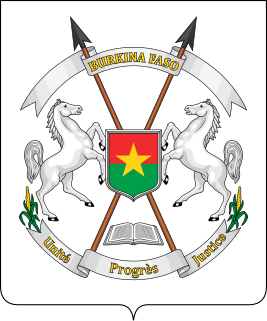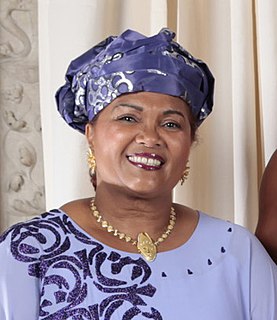| |||||
| Decades: | |||||
|---|---|---|---|---|---|
| See also: | |||||
Events in the year 1990 in Burkina Faso .
| |||||
| Decades: | |||||
|---|---|---|---|---|---|
| See also: | |||||
Events in the year 1990 in Burkina Faso .

The Politics of Burkina Faso takes place in a framework of a semi-presidential republic, whereby the Prime Minister of Burkina Faso is the head of government, and of a multi-party system. The President of Burkina Faso is the head of state. Executive power is exercised by both the President and the Government. Legislative power is vested in both the government and parliament. The party system was dominated by the Congress for Democracy and Progress (CDP) until the 2014 Burkinabé uprising. Since then, the CDP has lost influence. The Judiciary is independent of the executive and the legislature. The Economist Intelligence Unit rated Burkina Faso a "hybrid regime" in 2019.

Blaise Compaoré is a Burkinabé-Ivorian former politician who served as the second president of Burkina Faso from 1987 to 2014. He was a close associate of the first president, Thomas Sankara, during the 1980s, and in October 1987, he led a coup d'état during which Sankara was killed. Subsequently, he introduced a policy of 'rectification', overturning the leftist and Third Worldist policies pursued by Sankara. He won elections in 1991, 1998, 2005 and 2010, in what were considered unfair circumstances. His attempt to amend the constitution to extend his 27-year term caused the 2014 Burkinabé uprising. On 31 October 2014, Compaoré resigned, whereupon he fled to the Ivory Coast.

Burkina Faso elects on the national level a head of state – the president – and a legislature. The president is elected for a five-year term by the people. The National Assembly has 127 members, elected for a five-year term by proportional representation. Burkina Faso has held democratic elections since 1965. The history of elections has been slightly inconsistent, with the government dynamically changing at the hands of various coups, constitutional changes, and boycotts from various political parties. In 2015, the country experienced its first peaceful and fair election ever. Corruption plagued Burkina Faso's presidential elections for 50 years, but following a coup overthrowing Blaise Compaoré, the nation has seen more democratic and less corrupt electoral processes. Terrorism has played a substantial role in Burkina Faso's elections, with candidates running on the promise to keep the nation safe from the rise of Islamic jihadism they experienced in the 2010s. Historically, a few different parties have held power in Burkina. The Organization for Popular Democracy – Labour Movement was former president Compaoré's party affiliation, and thus they held power from 1987 to 2014. His party took power through a coup, and in 2014 also lost their control when the Regiment of Presidential Security overthrew the government.

Chantal Compaoré, born Chantal Terrasson de Fougères is the Franco-Ivorian wife of former President Blaise Compaoré of Burkina Faso. Born in the Dabou, Ivory Coast, after becoming the First Lady in 1987 she spent much of her time on charity work in Burkina Faso. Her husband, who came to power in a bloody 1987 military coup, was overthrown in the 2014 Burkinabé uprising. Chantal Compaoré was subsequently forced to flee to her home country, going into exile together with her husband.
Events from the year 2005 in Burkina Faso.

Presidential elections were held in Burkina Faso on 21 November 2010. Incumbent president Blaise Compaoré was re-elected with 80% of the vote. The elections were marred by claims of widespread fraud.
The 2011 Burkina Faso protests were a series of popular protests in Burkina Faso.

The 2014 Burkina Faso uprising was a series of demonstrations and riots in Burkina Faso in October 2014 that quickly spread to multiple cities. They began in response to attempts at changing the constitution to allow President Blaise Compaoré to run again and extend his 27 years in office. Pressure for political change came from civil society and in particular from the country's youth. Following a tumultuous day on 30 October, which included the involvement of former Defence Minister Kouamé Lougué and the burning of the National Assembly and other government buildings as well as the ruling Congress for Democracy and Progress party's headquarters, Compaoré dissolved the government and declared a state of emergency before eventually fleeing to Côte d'Ivoire with the support of President Alassane Ouattara.

The Regiment of Presidential Security, sometimes known as the Presidential Security Regiment, was the secret service organisation responsible for VIP security to the President of Burkina Faso, a landlocked country in West Africa. It was autonomous from the Army. Until 31 October 2014, the President was Blaise Compaoré, a military officer who came to power in a 1987 coup d'état. The elite unit was well known for its frequent involvement in the politics of Burkina Faso, acting as the iron fist of President Compaoré in his domination of the country. They were said to be widely feared by many people in the country, which in 2012 – two years prior to the end of Compaoré's government – was described by the Democracy Index as an "authoritarian regime".
The 1982 Upper Voltan coup d'état took place in the Republic of Upper Volta on 7 November 1982. The coup, led by the little-known Colonel Gabriel Yoryan Somé and a slew of other junior officers within the military, many of them political radicals, overthrew the regime of Colonel Saye Zerbo. Zerbo had previously taken power just under two years prior to his own downfall.
The following lists events that happened during 2014 in Burkina Faso.
Events in the year 2013 in Burkina Faso.
Events in the year 2011 in Burkina Faso.
Events in the year 2010 in Burkina Faso.
Events in the year 2008 in Burkina Faso.
Events in the year 2006 in Burkina Faso.
Events in the year 2004 in Burkina Faso.
Events in the year 2003 in Burkina Faso.
Events in the year 1999 in Burkina Faso.
Events in the year 1998 in Burkina Faso.